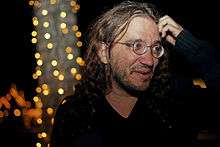Ben Goertzel
Ben Goertzel is an artificial intelligence researcher.
Ben Goertzel | |
|---|---|
 Ben Goertzel after giving a talk at the 2009 Humanity+ Summit in Irvine, California | |
| Occupation | CEO and Founder of SingularityNET |
Early life and education
During a June 2020 interview with Lex Fridman Ben mentioned that 3 of his Jewish great-grandparents immigrated to New York from Lithuania and border regions of Poland[1]. Goertzel is the son of Ted Goertzel, a former professor of sociology at Rutgers University.[2] Goertzel left high school after the tenth grade to attend Bard College at Simon's Rock, where he graduated with a bachelor's degree in Quantitative Studies.[3] Goertzel graduated with a PhD in Mathematics from Temple University under the supervision of Avi Lin in 1990.[4]
Career
Goertzel is the CEO and founder of SingularityNET, a project combining artificial intelligence and blockchain to democratize access to artificial intelligence.[5] He was a Director of Research of the Machine Intelligence Research Institute (formerly the Singularity Institute).[6] He is also chief scientist and chairman of AI software company Novamente LLC; chairman of the OpenCog Foundation; and advisor to Singularity University.
Goertzel was the Chief Scientist of Hanson Robotics, the company that created Sophia the Robot [7].
Views on AI
In May 2007, Goertzel spoke at a Google Tech talk about his approach to creating Artificial General Intelligence.[8] He defines intelligence as the ability to detect patterns in the world and in the agent itself, measurable in terms of emergent behavior of "achieving complex goals in complex environments".[9] A "baby-like" artificial intelligence is initialized, then trained as an agent in a simulated or virtual world such as Second Life[10] to produce a more powerful intelligence.[11] Knowledge is represented in a network whose nodes and links carry probabilistic truth values as well as "attention values", with the attention values resembling the weights in a neural network. Several algorithms operate on this network, the central one being a combination of a probabilistic inference engine and a custom version of evolutionary programming.[12]
The 2012 documentary The Singularity by independent filmmaker Doug Wolens showcased Goertzel's vision and understanding of making general AI general thinking[13][14]

See also
- Whole brain emulation
References
- Ben Goertzel: Artificial General Intelligence | AI Podcast #103 with Lex Fridman, YouTube, 22 June 2020
- Pauling's Prizes, The New York Times, 5 November 1995
- Goertzel, Benjamin (1985). Nonclassical Arithmetics and Calculi. Simon's Rock of Bard College.
- Ben Goertzel at the Mathematics Genealogy Project
- Popper, Nathaniel. "How the Blockchain Could Break Big Tech's Hold on A.I." The New York Times. The New York Times. Retrieved 28 May 2020.
- "The Singularity Institute's Scary Idea (and Why I Don't Buy It)", The Multiverse According to Ben, 29 October 2010
- Vincent, James. "Sophia the robot's co-creator says the bot may not be true AI, but it is a work of art". The Verge. The Verge. Retrieved 2 June 2020.
- Google Tech Talk by Ben Goertzel, 30 May 2007
- Roberts, Jacob (2016). "Thinking Machines: The Search for Artificial Intelligence". Distillations. 2 (2): 14–23. Archived from the original on 19 August 2018. Retrieved 22 March 2018.
- "Online worlds to be AI incubators", BBC News, 13 September 2007
- "Virtual worlds making artificial intelligence apps 'smarter'" Archived October 21, 2007, at the Wayback Machine, Computerworld, 13 September 2007
- "Patterns, Hypergraphs and Embodied General Intelligence", Ben Goertzel, WCCI Panel Discussion: "A Roadmap to Human-Level Intelligence", July 2006
- "The Singularity: A Documentary by Doug Wolens". Ieet.org. Retrieved 2013-10-22.
- "Pondering Our Cyborg Future in a Documentary About the Singularity – Kasia Cieplak-Mayr von Baldegg". The Atlantic. 2013-01-08. Retrieved 2013-10-22.
External links
| Wikimedia Commons has media related to Ben Goertzel. |
- TEDxBerkeley – "Decentralized AI" (video:16min, March 2019)
- SingularityNET